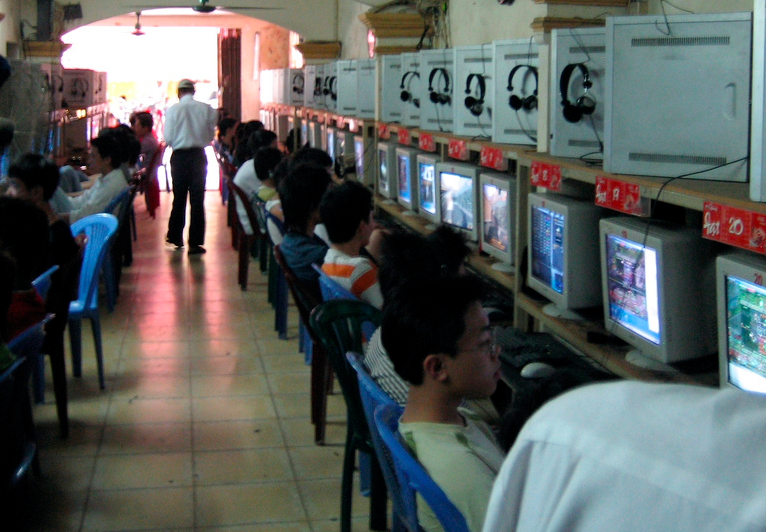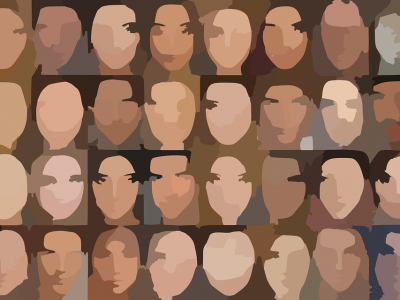
Internet cafe in Vietnam. Photo by Ivan Lian via Flickr (CC BY_NC-ND 2.0)
Hae-in Lim, Lisa Ferguson, Ellery Roberts Biddle, and Sarah Myers contributed to this report.
Global Voices Advocacy's Netizen Report offers an international snapshot of challenges, victories, and emerging trends in Internet rights around the world. This week's report begins in Vietnam, where social media users will soon face new threats of penalties for political speech. Comments that qualify as “propaganda against the state” or “reactionary ideology” will face soon fines of 100 million dong (USD $4,740) — unless they merit criminal charges. Other fine-worthy acts include uploading a map inconsistent government claims of sovereignty and operating e-commerce sites without proper licensing. These penalties reportedly aim to rein in speech that doesn’t quite necessitate prison time, but it is anyone's guess what this will mean in a country that has jailed 46 bloggers in this year alone.
Le Quoc Quan, one of the country’s most prominent bloggers, has been in prison for nearly a year. A human rights lawyer and advocate, Quan was arrested on trumped-up charges of tax evasion and convicted after a brief trial in October. This week, a UN Human Rights Council working group reviewed the case and surmised that “the real purpose of [Quan’s] detention and prosecution might eventually be to punish him for exercising his rights under article 19 of the International Covenant on Civil and Political Rights and to deter others from doing so.”
Free Expression: Free Press for Syria Campaign Demands End to Media Worker Abuses
A coalition of more than 20 Syrian media organizations has launched a campaign demanding an end to abuses against media workers in the country, who face threats from both government entities and terrorist groups. A petition launched by freepressforsyria.com reads, “Facing retaliation if they denounce the abuses aloud, and facing extinction if they don't, Syrian media have chosen the former. Despite intimidation and threats, Syrian media are uniting for the first time and standing up together to demand an end to the crimes committed against all journalists.” Sign the petition at Avaaz.org.
Earlier this year, officials described plans to develop more targeted, sophisticated systems for Internet censorship. This week, the Pakistan Telecommunications Authority demonstrated its ability to filter specific pages rather than entire websites when it blocked the IMDb.com movie database page for “The Line of Freedom,” a short film made in the embattled province of Baluchistan. Initially, the PTA had ordered Internet Service Providers to block the entire IMDb website, but lifted the ban following two days of public outcry. Pakistani NGO Digital Rights Foundation called this the government’s first documented use of selective web blocking.
In South Korea, an investigation by the public prosecutor’s office revealed that the Defense Ministry’s Cyberwarfare Command sent 23 million tweets in favor of current president Park Geun-hye during last year’s election season, and the National Intelligence Service sent a paltry 1.2 million tweets smearing opposition candidates. Tens of thousands of citizens angry over the scale of public opinion manipulation took to the streets in protest this week.
Thuggery: Egyptian Blogger Alaa Abd El Fattah Arrested Again
Blogger and leading democracy activist Alaa Abd El Fattah was taken from his home by police last Thursday night. His wife reported that police used violent force against the couple and seized their computers and mobile phones. Alaa was detained at a rally in Cairo a few days prior to the incident, but then released on the condition that he would present himself before police on November 30. Evidently authorities could not wait this long, and thus raided his home. Many suspect his arrest comes under Egypt’s new law aimed at curbing public protest. Alaa has been jailed multiple times since 2011, and faced incitement charges under Mohammed Morsi’s government. As usual, supporters are using the #FreeAlaa hashtag to express support and follow his case on Twitter.
The UN General Assembly adopted its first resolution on the safety of journalists on November 26. According to Reporters Without Borders, the new resolution condemns all attacks and violence against journalists and media workers in both conflict and non-conflict situations. It recognizes the evolution of the reporting profession from offline to online, and urges member states to do their best to prevent violence against journalists.
Surveillance: Microsoft ups privacy for Chinese Skypers
Microsoft announced that it has “lifted all censorship restrictions” from TOM Skype, the company’s Skype-like product for the Chinese market. Skype is encrypting all user calls, chats, and login information and sending them directly to Microsoft servers located in Singapore, Ireland, and the United States. But questions remain, particularly given Microsoft’s ongoing negotiations with the Chinese government. In a recent blog post, advocacy group GreatFire.org asked Microsoft to “explain the differences between [surveillance capabilities for] the Chinese and international versions” and to spell out precisely how this approach does and does not adhere to state regulations.
Industry: Facebook discovers Kosovo is a country
On November 21, approximately 200,000 Kosovar Facebook users awoke to find that their country of origin had shifted from either Serbia or Albania to Kosovo. Facebook had previously not recognized Kosovo as a sovereign nation, and therefore did not list it as a “country of origin” option for user profiles. The Republic of Kosovo declared independence from Serbia over five years ago and recognized by most but not all UN member states.. It is unclear whether or not social media campaigns to change this had any effect on the company’s decision.
After a seventh-month-long investigation, the Dutch Data Protection Agency determined that Google's most recent terms of service, enacted in March 2012, violated Dutch privacy laws by combining user data from various online services without “properly inform[ing] users which personal data the company collects and combines, and for what purposes.”
Internet Insecurity: Bitcoin burglars on the rise
Cybercriminals are increasingly targeting companies with large Bitcoin holdings as the price of Bitcoin skyrockets. The latest victim of these attacks is BIPS, a European Bitcoin payment processor, which lost roughly US$1 million after a cyberattack. According to Ars Technica, the attack was at least the third major heist in a month. Guard your wallets, geeks.
Cool Things
A new, China-focused circumvention tool called Lantern uses peer-to-peer technology, allowing users to invite friends into a “trust network” and enabling members of the same network to share open or VPN Internet connections with their friends. This “trust network” makes it difficult for the government to discover individual access points as the network is dispersed and distributed.
Creative Commons issued the fourth generation of its Attribution-Share Alike license (CC BY-SA 4.0). This license enables users to share digital material provided they distribute the original author’s contributions under the same license as the original. It also addresses differences in the way the United States and European Union manage database rights.
Subscribe to the Netizen Report by email



